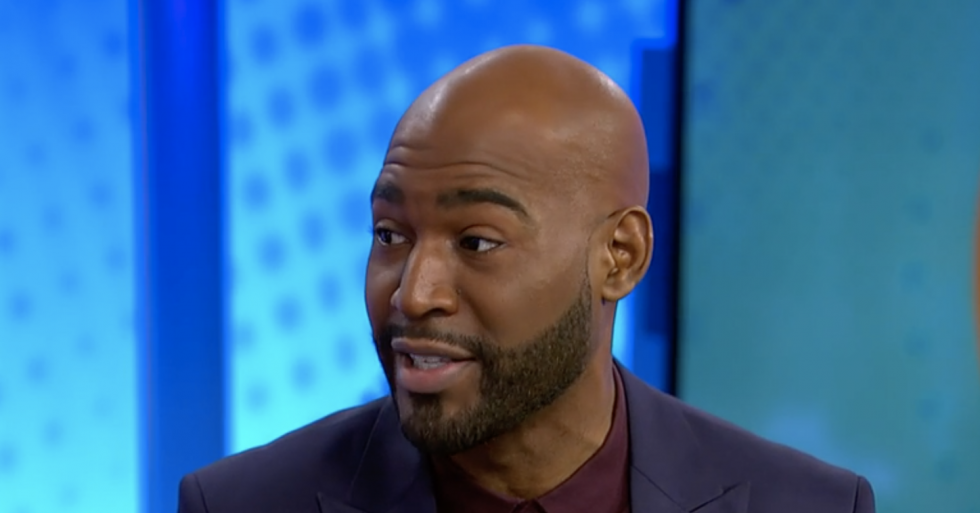Karamo Brown from 'Queer Eye' talks about his wake up moment

When he walks into a room, his infectious positivity is impossible to ignore. Karamo Brown is a father, son, brother, and ultimately everyone's best friend. He greets people with hugs, not handshakes. His self-awareness and journey to success can be categorized as realness.
He is currently a member of the "Fab 5" on the Netflix reboot of Queer Eye. He is the culture expert on the show, but really serves up the best advice for anyone searching to become their true selves. Not everyone can be on Queer Eye, so we got the scoop from him about what everyone needs to succeed. We also chatted about his personal growth experience from his interaction with one of the "heroes" that the team makes over. Check it out below.
What got you to Queer Eye?
Brown: I have been hosting now for about three and a half years. Every job that I have had I feel like has been leading me to this moment. I started with the Oprah Winfrey Network (OWN) which taught me all about the inside. My background is in social work and psychotherapy.
I saw Carson Kressley talking about the show on Watch What Happens Live. I called my agent and said I need to be on there. I’m gay — get me on there.
They said no. Actually, they didn’t want to see me. They said they had already finished their casting. My team begged them to see me. Luckily, they did, and now I am a part of the "Fab 5."
Well, they say when something is for you, it is for you no matter what.
Brown: You better preach girl, that is exactly what it is!
You are the culture expert on the show, but when I watched I got all of the mentoring tips. You spoke about getting your swag back, but you focused on the inside. How did you create that role?
Brown: For me, "culture" was not truly defined. Jai Rodriguez did an amazing job giving away tickets for Broadway and things of that nature. However, my background is in social work and I wanted to talk about fixing the inside. At first, everyone was like how do we do this, but luckily they went along with me.
"I truly believe it is great that we are fixing the outside. But if we can’t help someone to understand what is blocking them and keeping them stagnant, then they won’t have true growth."
I think this is why we’ve seen our heroes, that's what we call the guys that we help, have this real growth. It is because we fixed the inside.
The first episode, I literally got a tear. I felt the word "confidence" ring.
Brown: Because that is what it is all about. I don’t care what you have on or what you do with your hair. If you can’t look in the mirror and say I love me for me… even if you are on the journey to change something about yourself… you will never be happy. So that is what it is. It all starts with confidence.
How did starting in social work turn into being on television?
Brown: Television has always been my dream. After I graduated, I actually moved to California and I was working at a non-profit. Then, I had the opportunity to be on The Real World. That sparked that dream in me to be on television, but I was too young and reckless. Almost ten years later, after becoming a father, I said I am going to go after my dreams now. It was inspired by my youngest son and luckily over these past four years it has been working.
"The real lesson for me was… is that you have to find a place in your life that you decide enough is enough of not living your dreams and go after it."
So, you were over 30 by the time you hit that "moment," which Is common among stars now like Issa Rae, Tiffany Haddish and others. What would you say to someone who is in their twenties trying to get there?
Brown: We are a youth-obsessed culture. So if you look at TV and everyone says if you are not 18 or 21 you missed your chance.
That's not the truth. With life you have more experiences, you grow, and you learn. I remember hearing my mother and sister say they love being in their 30s and 40s because they came into their womanhood. And now being in my mid-to-late 30s and going in my 40s I feel secure as a man. That security and that confidence have allowed my career to blossom. So anyone who is trying to make it, if it is not working at the perceived time or timeframe in your mind, know that it is not on your time. It is on a higher power’s time. I believe in GOD so I always refer back to the Lord.
What do you say to someone who feels they have messed up?
Brown: I would tell them to say thank you for that mess up. Messing up is the greatest lesson you could have. I have never heard one person in my life and I have been hanging around millionaires, billionaires, successful TV producers, doctors, lawyers, and all have said they failed at one point or failed constantly.
I have had different hosting jobs over the past four years and each one I have failed. I remember my first hosting job was similar to what I am doing on The Jam and I…was…horrible. Hopefully, you all think I have gotten a lot better. [Laughs] But I remember someone saying go to prompter and I am like, "Eeeehhh."
Now I don’t have those fears anymore, but I needed to fail in order to be great.
"So, people need to remember that when they have those failures and get those lessons, say thank you for them."
People often discuss their "wake-up" moment. Have you ever had that?
Brown: This lingers in us often. You could be watching TV or walking down the street and you keep seeing something that reminds you of what you should be doing with your life. But a lot of times, we have been taught as a culture that you have to suppress that or go down a certain path. But it always lingers in us — what is your true destiny is right there. The roadmap is built in you. It is just if you are going to walk and use that roadmap.
For me, it was lingering in there that I wanted to be on TV. I wanted to help people through TV, but I did not have the courage. Finally, my youngest son was writing a paper and asked me if I was living my dreams. He was nine-years-old. I knew at that moment I could lie and say yes, or I could say no. But, if I said no I would have to model the proper way to be.
After that, I just started going after that.
In one episode of Queer Eye, you have a one-on-one conversation with a police officer about the Black Lives Matter movement. I want to chat about that moment with the officer. How were you feeling?
Brown: That moment for me was monumental. For an African-American and police officer to sit down and have a conversation... and for a police officer to talk about Black Lives Matter in a way that acknowledges our struggle and pain was pretty powerful for me.
I get messages from people all the time saying “Oh my gosh, I never understood what it was like for a person of color to drive and feel a certain amount of fear.”
“I never heard a police officer acknowledge that."
For me, I had to take a step out of my own pain and acknowledge that you are trying to be better. Instead of having my ego and saying “yeah that's right you better had said that.”
I did realize that I started to dehumanized all police officers and try to lump them together... I took a step back and said I am not going to lump you in. I am going to see you as an individual and the man that you are.
It allowed me to grow.
I get messages from people who say, "Thank you for your experience because now we see the Black Lives Matter movement in a different light than what the media portrayed it."
*This interview has been edited and condensed



